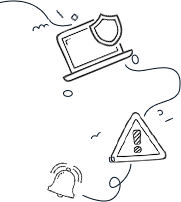Introduction
Picture this: an email pops up in your inbox from a recruiter. The title screams “Dream Job Opportunity!” promising better pay, flexible hours, and probably a gold-plated corner office with a view of the sunset. Sounds enticing, right?
Upon closer inspection, the email looks as polished as your favorite pair of shoes, complete with a fancy signature and that oh-so-familiar company logo. You’re flattered and maybe even tempted to click the link to “learn more.”
Hold your horses!
Did you know that headhunter phishing scams skyrocketed by 118% in 2023? That’s right—while you were binge-watching your favorite series, cybercriminals were busy crafting their next elaborate con. These sneaky attacks lure victims into dishing out sensitive information or unwittingly infecting their systems.
So, regardless of your job title—whether you’re the office ninja or the water cooler gossip champion—you are a target. How can you keep your job search safe in this virtual jungle?
What Is Headhunter Phishing?
Phishing scams are those annoying, albeit dastardly, fraudulent messages trying to swindle away your private information. They often tug at your heartstrings—or your wallet—to trick you into handing over the goods.
Then there’s spear phishing, which is like phishing’s evil twin. These attacks are not random; they target you specifically, often using info harvested from your social media profiles and AI to craft that oh-so-convincing message made just for you!
Wait, let’s dig even deeper. Headhunter phishing is a sneaky form of spear phishing where cyber crooks masquerade as recruiters or HR pros to lure unsuspecting victims. Expect a job offer, an urgent form to fill out, or even a downloadable resume template. Spoiler: it’s a trap!
Clicking that link or opening that attachment could install malware, allowing the bad guys to pilfer your login credentials or create a backdoor into your company’s system. In this remote-work age, job offers seem to pop up like daisies after the rain. But how do you tell the genuine from the junk?
How Can You Stay Safe While You Job Search?
Headhunter phishing scams can lead to catastrophic consequences for your company network, which is a solid reason to avoid job hunting while “working from home.” (Trust us, your boss probably won’t buy the excuse that you were “just exploring career opportunities.”) Think of all the things that could go awry: stolen customer data, financial losses, or a grand ransomware attack that locks up your company’s systems like a vault. Even your personal laptop wouldn’t be safe if you fall for these scams at home!
These crafty spear-phishing attacks work like magic tricks because they target you specifically. If your company gets hit, it’s not just about the money—your job could be in jeopardy if operations come to a screeching halt. Plus, let’s be honest, no one wants to be the person who inadvertently invited cybercriminals to the workplace party!
In a classic and cheeky example, scammers impersonated a top recruiter at Google. They hosted fake interviews via video calls, using deepfake technology to mimic the recruiter’s appearance and voice. How’s that for a plot twist? Victims were asked for personal information and even had to pay for background checks or training materials—none of which were ever refunded or followed up by an actual job offer!
Protecting Yourself from Headhunter Phishing
Headhunter phishing scams are a real headache, and they can cost a pretty penny. Here’s how to keep yourself safe while giving legitimate recruiters the time of day.
- Pause and verify. Did you receive an email from a “recruiter”? Don’t click links or download files. Check the sender’s email domain (e.g., “recruiter@fakecompany.com” is a major red flag). If it feels fishy, it probably smells like a tuna. Call the company using a trusted number to confirm. Many phishers create email addresses that closely mimic the real deal, making them look legit at first glance.
- Watch for red flags. Spelling mistakes, urgent language (“Act now!”), or generic greetings (“Dear User”) are all warning signs. Real recruiters know your name and probably wouldn’t address you like you’re on a first-name basis with a pizza delivery guy.
- Use MFA. If your company provides multi-factor authentication, enable it. Even if they snag your login credentials, they’d still need another way to prove they’re you—so unless they have a magical crystal ball, they’re out of luck.
- Report suspicious emails. If something seems fishy, report it. And don’t forget to abide by any company policies regarding these types of situations—because no one wants to be the office snitch.
- Stay sharp! Keep your eyes peeled for phishing awareness training, refresher videos, and anything about phishing making the news. Knowledge is power, after all!
By staying vigilant, verifying suspicious emails, and reporting any red flags, you can be a key player in your company’s frontline defense!
Conclusion
To shield yourself from headhunter scams, always verify job offers and their recruiters’ legitimacy. Check the company’s official website and contact them directly using verified channels. Remember, unsolicited job offers should never come with a price tag or requests for sensitive information!
Headhunter phishing is a devious trap that preys on your trust and ambition. So, the next time a “recruiter” slides into your inbox unannounced, pause and ponder: Is this too good to be true? Chances are, it probably is.
Stay alert to scams like this while you’re on the job hunt. The more aware you are, the safer you’ll be in the wild world of the web!
The post Headhunter Phishing: Navigating Unsafe Job Recruiters appeared first on Cybersafe.




